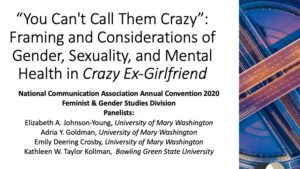
NCA 2020 Presentation Panel
Adria Goldman, Emily Crosby, and Elizabeth Johnson-Young presented a panel at the National Communication Association’s virtual conference. The paper session, “You Can’t Call Them Crazy”: Framing and Considerations of Gender, Sexuality, and Mental Health in “Crazy Ex-Girlfriend,” shared the panelists’ research from a variety of lenses and methodologies regarding the messaging and impact of the CW musical-comedy television series that ran from 2015-2019.
Johnson-Young’s presentation, “The Situation is a Lot More Nuanced Than That:” A Qualitative Analysis of Women’s Mental Health in the Humor and Music of “Crazy Ex-Girlfriend,” investigated the ways in which the show’s music and humor, particularly feminist humor, was used throughout the series to communicate and challenge traditional media messaging of mental health and gender biases in health. Goldman’s presentation, The Awkward Revolution: A Framing Analysis of Awkwardness, Humor, and Sexuality in Rachel Bloom’s “Crazy Ex-Girlfriend,” explored how humor and music were used as rhetorical devices to present new representations of women’s sexuality, while also challenging existing, problematic narratives. Crosby’s presentation, “Type A Ambition”: Postfeminist Tropes in “Crazy Ex-Girlfriend” explored the postfeminist themes in contemporary media that often unfavorably frame ambitious women as personally unfulfilled and unlikable. Deeper rhetorical analysis reveals that the series pushes back against postfeminist tropes, providing a more nuanced depiction of complicated characters who subvert postfeminist pitfalls that oversimplify “having it all.”